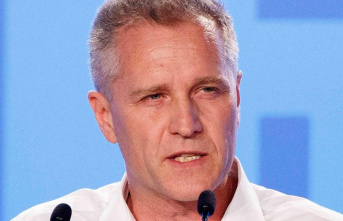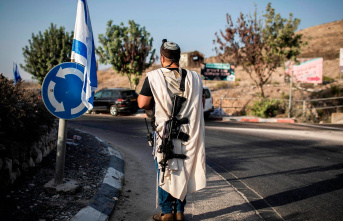The controversial proposal by the traffic light coalition for an electoral law reform is up for debate in the Bundestag for the first time. The plans of the SPD, Greens and FDP should ensure that the Bundestag shrinks back to its normal size of 598 MPs after the next election. The traffic light coalition hopes for broad support - but wants to pass the reform if necessary without an agreement with the Union in the Bundestag.
"We want to pass our law in early March and hope for a broad parliamentary majority," said the SPD parliamentary group's domestic policy spokesman, Sebastian Hartmann, of the German Press Agency. "A broad-based decision to downsize parliament involving the largest opposition faction would be a great gain," said FDP faction leader Konstantin Kuhle of the "Rheinische Post". However, the CDU and CSU should not insist on an electoral law that allows unilateral advantages that go beyond the election result, added Kuhle.
After the 2021 election, the Bundestag was larger than ever with 736 MPs. This is due to the many overhang and compensation mandates. Overhang mandates arise when a party wins more mandates from the first votes than it is entitled to based on the result of the second vote. The party may keep these additional mandates. The other parties receive compensatory mandates in return.
Overhang mandates are to be deleted
The proposal by the traffic light groups provides for the overhang and compensation mandates to be completely deleted. The Union rejects this, especially the CSU, which benefits particularly strongly from this regulation. Her own proposal would reduce the number of constituencies from 299 to 270. This would also significantly reduce the number of overhang and compensation mandates. Group leader Friedrich Merz (CDU) has offered the traffic light coalition talks about a possible compromise.
Hartmann is critical of the Union's proposal. "29 fewer constituencies mean 29 times fewer options for voters," said Hartmann, defending the traffic light plans against criticism. "With our proposal, all chances remain the same, because neither party will have a unilateral advantage or disadvantage from it."
The AfD is also against the Union's proposal. In their application it says: "The constitutional and fair solution to the downsizing of the German Bundestag consists in allocating the direct mandates in the 299 constituencies that will remain unchanged in each federal state in such a way that no more overhang mandates arise."
Hundreds of millions could be saved
The left remained below the five percent hurdle in the last federal election and only got into parliament thanks to three direct mandates in the size of the parliamentary group. She is now taking the debate as an opportunity to promote her proposal to allow foreigners to vote in the Bundestag elections after at least five years of legal residence.
In any case, downsizing for the Bundestag would also result in cost savings. Because the elected officials employ employees. Offices must be maintained and trips paid for. In the 2023 budget, costs totaling around 1.14 billion euros are estimated for the Bundestag. In 2018 it was 974 million euros, in 2016 the expenditure was still around 857 million euros according to the Federal Ministry of Finance.
"So far we can only estimate the concrete savings," said the electoral law expert for the Greens parliamentary group, Till Steffen, of the German Press Agency. However, the return to the standard size of 598 MPs would probably save several hundred million.











